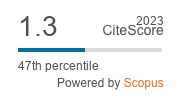Spectral Analysis Of Business Cycles In The Visegrad Group Countries
DOI:
https://doi.org/10.1515/cer-2017-0012Keywords:
business cycle, synchronization, spectral analysis, Fourier representationAbstract
This paper examines the business cycle properties of Visegrad group countries. The main objective is to identify business cycles in these countries and to study the relationships between them. The author applies a modification of the Fourier analysis to estimate cycle amplitudes and frequencies. This allows for a more precise estimation of cycle characteristics than the traditional approach. The cross-spectral analysis of GDP cyclical components for the Czech Republic, Hungary, Poland and Slovakia makes it possible to assess the degree of business cycle synchronization between the countries.
Downloads
References
Aguiar-Conraria L., Soares M.J. (2011), Business Cycle Synchronization and the Euro: a Wavelet Analysis, ‘Journal of Macroeconomics’, Vol. 33, 477–489.
Google Scholar
Artis M., Krolzig H.M., Toro J. (2004a), The European Business Cycle, ‘Oxford Economic Papers’, 56, 1–44.
Google Scholar
Artis M.J., Marcellino M., Proietti T. (2004b), Characterizing the business cycle for accession countries, CEPR Discussion Papers 4457.
Google Scholar
Backus D.K., Kehoe P.J., Kydland F.E. (1992), International Real Business Cycles, ‘Journal of Political Economy’, Vol. 100, No. 4, 745–775.
Google Scholar
Bartlett M.S. (1950), Periodogram Analysis and Continuous Spectra, ‘Biometrika’, Vol. 37, No. 1–2, 1–16.
Google Scholar
Baxter M., King R.G. (1995), Measuring Business Cycles: Approximate Band-Pass Filters for Economic Time Series, Working Paper No. 5022, National Bureau of Economic Research, Cambridge.
Google Scholar
Beveridge S., Nelson C.R. (1981), A New Approach to Decomposition of Economic Time Series into Permanent and Transitory Components with Particular Attention to Measurement of the ‘Business Cycle’, ‘Journal of Monetary Economics’, 7, 151–174.
Google Scholar
Burns A.F., Mitchell W.C. (1946), Measuring Business Cycles, N.Y.: National Bureau of Economic Research, New York.
Google Scholar
Camacho M., Perez-Quiros G., Saiz L. (2008), Do European business cycles look like one?, ‘Journal of Economic Dynamics and Control’, Vol. 32, No. 7, 2165–2190.
Google Scholar
Campbell J.Y., Mankiw N.G. (1987), Permanent and Transitory Components in Macroeconomic Fluctuations, ‘American Economic Review’ (Papers and Proceedings), 77, 111–117.
Google Scholar
Chatfield C. (1996), The Analysis of Time Series: An Introduction, Chapman & Hall, London.
Google Scholar
Christiano L.J., Fitzgerald T.J. (1999), The Band Pass Filter, Working Paper No. 9906, Federal Reserve Bank of Cleveland.
Google Scholar
Clark P.K. (1987), The Cyclical Component of U.S. Economic Activity, ‘The Quaterly Journal of Economics’, Vol. 102, 797–814.
Google Scholar
Crowley P., Lee J. (2005), Decomposing the Co-movement of the Business Cycle: A Time-Frequency Analysis of Growth Cycles in the Euro Area, Bank of Finland discussion papers 12/2005.
Google Scholar
Darvas Z., Szapary G. (2008), Business Cycle Synchronization in the Enlarged EU, ‘Open Economies Review’, Vol. 19, No. 1, 1–19.
Google Scholar
Fidrmuc J., Korhonen I. (2006), Meta-analysis of the Business Cycle Correlation Between the Euro Area and the CEECs, ‘Journal of Comparative Economics’, Vol. 34, No. 3, 518–537.
Google Scholar
Forni M., Hallin M., Lippi M., Reichlin L. (2000), The Generalized Dynamic-factor Model: Identification and Estimation, ‘The Review of Economics and Statistics’, Vol. 82, No. 4, 540–554.
Google Scholar
Hamilton J.D. (1994), Time Series Analysis, Princeton University Press.
Google Scholar
Hanus L., Vacha L. (2015), Business Cycle Synchronization of the Visegrad Four and the European Union, IES Working Paper: 19/2015.
Google Scholar
Harding D., Pagan A. (2006), Synchronization of Cycles, ‘Journal of Econometrics’, Vol. 132, No. 1, 59–79.
Google Scholar
Harvey A.C. (1985), Trends and Cycles in Macroeconomic Time Series, ‘Journal of Business and Economic Statistics’, Vol. 3, 216–227.
Google Scholar
Harvey A.C. (1989), Forecasting, Structural Time Series Models and the Kalman Filter, Cambridge University Press, Cambridge, New York and Melbourne.
Google Scholar
Harvey A.C. (2000), Trends Analysis, University of Cambridge, Faculty of Economics and Politics.
Google Scholar
Hodrick R., Prescott E. (1980), Post-War U.S. Business Cycles: An Empirical Investigation, Working paper, Carnegie Mellon University.
Google Scholar
Hodrick R.J., Prescott E.C. (1997), Postwar U.S. Business Cycles: An Empirical Investigation, ‘Journal of Money Credit and Banking’, Vol. 29, No. 1, 1–16.
Google Scholar
Inotai A., Sass M. (1994), Economic Integration of Visegrad Countries. Facts and Scenarios, ‘Eastern European Economics’, Vol. 32, No. 6, 6–23.
Google Scholar
Kaposzta J., Nagy H. (2015), Status Report about the Progress of the Visegrad Countries in Relation to Europe 2020 Targets, ‘European Spatial Research and Policy’, Vol. 22, No. 1, 81–99.
Google Scholar
Kydland F., Prescott C. (1990), Business Cycles: Real Facts and A Monetary Myth, Federal Reserve Bank of Minneapolis, Quarterly Review (Spring), 3–18.
Google Scholar
Lee J. (2012), Measuring Business Cycle Comovements in Europe: Evidence from a Dynamic Factor Model with Time-varying Parameters, ‘Economics Letters’, Vol. 115, No. 3, 438–440.
Google Scholar
Lucas R.E. (1977), Understanding Business Cycles, [in:] Brunner K., Meltzer A. H. (eds.), Stabilization of the Domestic and International Economy, Carnegie-Rochester Conference Series on Public Policy 5, Amsterdam: North Holland, 7–29.
Google Scholar
Nelson C.R., Plosser C.I. (1982), Trends and Random Walks in Macroeconomic Time Series: Some Evidence and Implications, ‘Journal of Monetary Economics’, 10, 139–162.
Google Scholar
Parzen E. (1961), Mathematical considerations in the estimation of spectra: Comments on the discussion of Messers, Tukey, and Goodman, ‘echnometrics’, 3, 167–190; 232–234.
Google Scholar
Priestley M.B. (1981), Spectral Analysis and Time Series, Vols 1 and 2, Academic Press, London.
Google Scholar
Stock J., Watson M. (2005), Understanding Changes in International Business Cycle, ‘Journal of European Economic Association’, Vol. 3, No. 5, 968–1006.
Google Scholar
Stock J.H., Watson M.W. (1988), Variable Trends in Economic Time Series, ‘Journal of Economic Perspectives’, Vol. 2, 147–174.
Google Scholar
Warner R.M. (1998), Spectral Analysis of Time Series Data, ‘The Guilford Press’, New York.
Google Scholar
Watson M.W. (1986), Univariate Detrending Methods with Stochastics Trends, ‘Journal of Monetary Economics’, Vol. 18, No. 1, 49–75.
Google Scholar
Zarnowitz V., Ozyildirim A. (2001), Time Series Decomposition and Measurement of Business Cycles, Trends and Growth Cycles, ‘Economics Program Working Paper Series’, The Conference Board, New York.
Google Scholar
Downloads
Published
How to Cite
Issue
Section
License

This work is licensed under a Creative Commons Attribution-NonCommercial-NoDerivatives 4.0 International License.











